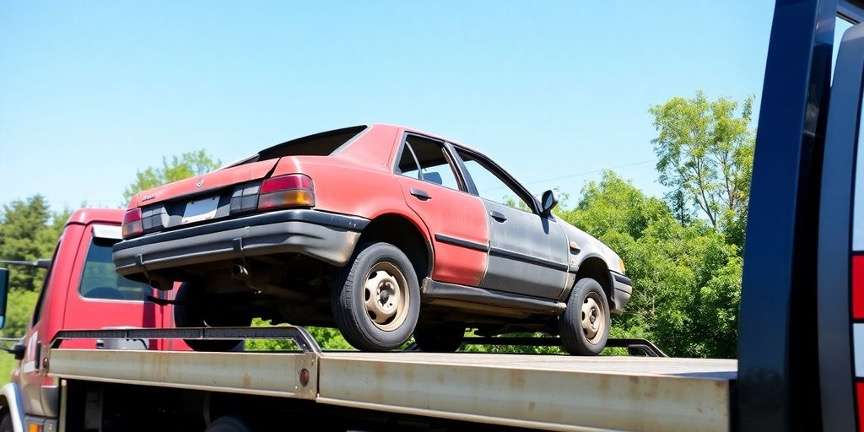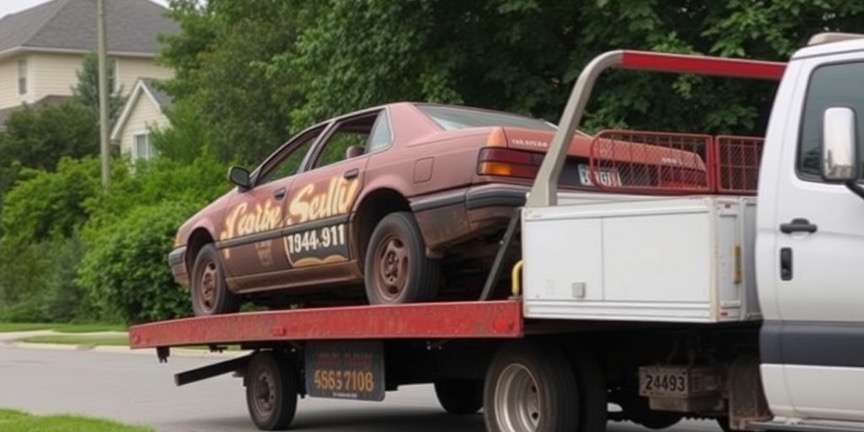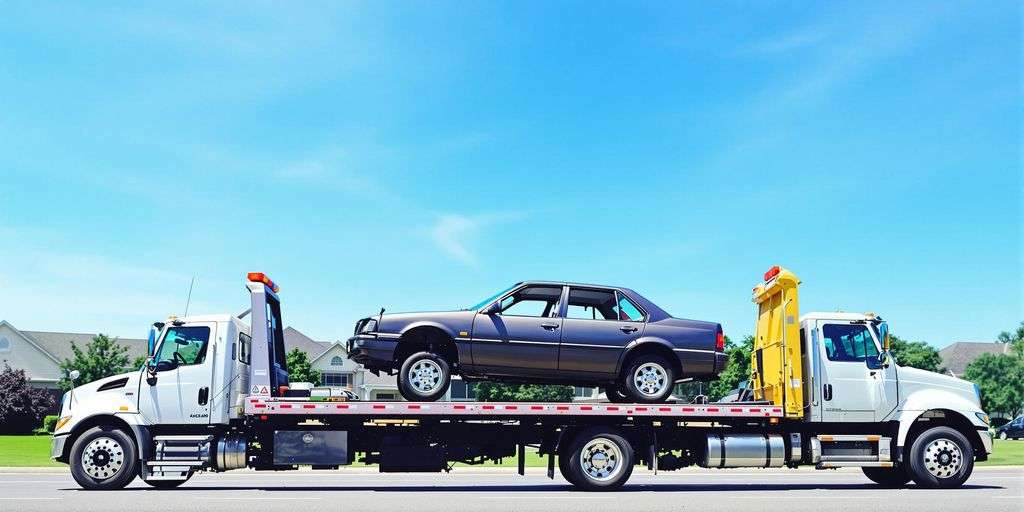Key Takeaways
- Assess your car's condition and understand its value before making a move.
- Consider hiring a professional towing service for hassle-free transportation.
- Explore online platforms for connecting with potential buyers quickly.
- Think about dismantling your car and selling parts separately for more profit.
- Always prepare for negotiations by understanding buyer expectations and having all paperwork ready.
Understanding the Challenges of Non-Drivable Junk Cars
Assessing the Condition of Your Junk Car
When you first realize your car isn't going anywhere under its own power, it can be a bit of a shock. It's crucial to evaluate its condition before deciding your next move. Is the engine shot, or is it just a flat tire? Knowing what’s wrong helps you figure out the best way to sell or dispose of it. Sometimes, a quick fix could make it drivable again, but more often than not, you're dealing with a real clunker.
Legal Considerations for Selling Non-Drivable Cars
Selling a car that doesn’t run can be tricky from a legal standpoint. You need to have the title in hand, and if there's a lien on it, that has to be settled first. Also, be aware of local laws regarding the sale of junk vehicles. Some places require specific paperwork or even an inspection before you can sell. Ignoring these steps could lead to fines or other legal headaches.
Environmental Impact of Abandoned Vehicles
Leaving a junk car to rot isn’t just an eyesore; it's an environmental hazard. These vehicles can leak harmful fluids like brake oil and coolant, contaminating the soil and nearby water sources. Over time, this pollution can harm wildlife and ecosystems. Plus, junk cars take up space in landfills where they contribute to non-biodegradable waste.
Letting an old car sit around isn’t just bad for the environment; it’s a missed opportunity to recycle valuable parts and materials. Many components can be refurbished and reused, reducing the need for new resources and helping to ship a non-running car responsibly.
Exploring Towing and Transportation Options
Hiring a Professional Towing Service
Getting your junk car to a buyer when it won't drive can be a headache. Hiring a professional towing service is a straightforward solution. They handle everything from loading to transportation, ensuring your vehicle reaches its destination safely. Professional towing services offer peace of mind, knowing your car is in capable hands. Plus, many services provide insurance coverage for any potential damage during transit.
Utilizing Flatbed Transportation
Flatbed transportation is another reliable method for moving non-drivable cars. Unlike traditional towing, flatbed trucks carry the entire vehicle on a platform, reducing wear and tear. This method is particularly useful for cars with severe damage or low clearance. It's a bit more expensive, but the added protection can be worth it.
Exploring DIY Towing Solutions
For those looking to save money, DIY towing might be an option. However, it requires the right equipment and knowledge. You'll need a tow bar or a tow dolly, and it's crucial to ensure your vehicle's weight and size are compatible with your towing vehicle. DIY towing can be risky, so consider your comfort level and experience before attempting it.
Moving a junk car that doesn't drive requires careful planning. Whether you choose professional help or a DIY approach, understanding the options can make the process smoother and more efficient.
Consider using a Sterling junk car removal service to eliminate clutter and hazards from your property, reclaiming space and enhancing your environment.
Leveraging Technology for Junk Car Removal
Using Online Platforms to Find Buyers
In today's digital world, selling your junk car has never been easier. Online platforms have become a go-to solution for many people looking to get rid of their old vehicles. These platforms connect sellers with buyers who are specifically interested in purchasing junk cars. You simply list your car, provide some details, and wait for offers. It's convenient and often quicker than traditional methods.
- Create a detailed listing with photos
- Describe the car's condition honestly
- Set a realistic price based on market research
Virtual Assessments and Valuations
Virtual assessments are becoming a popular way to evaluate the worth of a junk car. Instead of waiting for someone to come out and inspect your vehicle, you can now use apps and websites to get an estimate. This technology saves time and can give you a ballpark figure without leaving your home.
- Upload clear photos of your car
- Provide accurate information about its condition
- Receive a valuation within minutes
Digital Documentation and Paperwork
Gone are the days of endless paperwork. With digital solutions, you can manage all the necessary documents for selling your junk car online. This includes transferring the title, signing contracts, and even scheduling pick-ups. Everything is streamlined, making the process much smoother.
Embracing digital tools not only simplifies the sale but also speeds up the entire process, ensuring you get your car sold with minimal hassle.
These advancements in technology are reshaping how we approach junk car removal, making it more accessible and efficient than ever before. Whether you're using an auction technology or other online resources, the options are vast and varied.
Creative Solutions for Moving Your Junk Car

Dismantling and Selling Parts Individually
If your junk car is beyond repair, consider breaking it down and selling the parts. This approach can be surprisingly profitable. Some components, like alternators, starters, or even seats, can fetch a good price. Selling parts individually not only maximizes your earnings but also helps other car owners find affordable replacements. You can use online marketplaces or local auto shops to sell these parts.
Partnering with Scrap Metal Recyclers
Scrap metal recyclers are always on the lookout for old vehicles. By partnering with them, you can get rid of your junk car while earning some cash. These businesses pay based on the weight of the scrap metal, so you might want to strip out any non-metal parts first. It's an eco-friendly way to dispose of your car, helping to reduce environmental hazards.
Innovative Community-Based Solutions
Community-based solutions can be a fun and engaging way to move your junk car. Organize a local event, like a “Junk Car Rally,” where participants can creatively tow or push cars to a designated location. This not only solves your problem but also brings the community together. Alternatively, consider donating the car to a local charity or community project that can use its parts or scrap value.
Negotiating with Buyers for Non-Drivable Cars
Understanding Buyer Expectations
When you're selling a non-drivable car, it's important to know what the buyer is looking for. Most buyers are interested in the parts or metal value of the vehicle, rather than its ability to run. Be clear about the car's condition and any valuable components it might have. This transparency helps set realistic expectations and builds trust. Buyers appreciate honesty, and it can lead to smoother negotiations.
Preparing for Price Negotiations
Before you start haggling, do your homework. Research the going rate for scrap metal and used parts. This gives you a solid foundation to negotiate from. Keep in mind that prices can vary widely depending on the market and the specific parts your car has. Make a list of the car's features that might add value, like a relatively new battery or rare parts. During negotiations, highlight these points to justify your asking price.
Finalizing the Sale and Transfer
Once you've agreed on a price, it's time to wrap things up. Make sure all paperwork is in order, including the title transfer. This protects both you and the buyer. If possible, meet in a safe, public place to complete the transaction. Many buyers prefer cash, but some might offer a certified check. Double-check everything before handing over the keys.
Selling a junk car might seem daunting, but with the right preparation, it can be a straightforward process. Keep communication open and be ready to compromise to close the deal.
Maximizing Value from Your Junk Car

Identifying Valuable Components
When you're trying to squeeze the most out of your old clunker, look under the hood for hidden gems. Start by identifying parts that still have some life in them. Engines, transmissions, and catalytic converters can fetch a pretty penny. Even smaller components like mirrors or seats might be worth something. Knowing what's still good can really boost your car's worth.
Exploring Alternative Selling Channels
Don't just stick to the usual routes when selling your junk car. Sure, scrapyards are an option, but have you thought about online platforms? These sites can connect you with buyers who might offer a better deal. You could also consider selling parts individually if you've got the skills to take them out. This way, you might get more cash than selling the whole car at once.
Reinvesting Proceeds into New Ventures
Once you've sold your junk car, think about what you can do with the money. Maybe put it towards a new vehicle, or invest in something you've been eyeing. It's a chance to turn what was once a rust bucket into something useful.
Selling a junk car isn't just about getting rid of an eyesore. It's about finding opportunities in what seems like a heap of metal. With a bit of effort, you can turn your trash into treasure.
And remember, the value of a junk car depends a lot on its condition. Even if it doesn’t run, parts can be worth something, so don’t underestimate what you have.
Wrapping It Up: Getting Your Junk Car to the Buyer
So, there you have it. Even if your old car's not running, there's still a bunch of ways to get it to the buyer. From hiring a tow service to using a flatbed trailer, or even checking if the buyer offers free pickup, you're covered. It's all about finding what works best for you and your situation. Plus, getting rid of that junk car not only clears up space but can also put some cash in your pocket. Who knew that old clunker could still be worth something? Just remember to do your homework, compare options, and make sure all your paperwork is in order. With a little effort, you'll have that car sold and out of your hair in no time. Good luck!
Frequently Asked Questions
How can I sell my junk car if it's not running?
You can sell your non-running junk car by contacting junk car buyers, scrap yards, or using online platforms that specialize in buying junk vehicles. Many buyers offer towing services to pick up your car.
What documents do I need to sell my junk car?
To sell your junk car, you'll typically need the car title, registration, and a form of identification. If you don't have the title, check local laws for alternative documentation options.
How do I find a reputable buyer for my junk car?
Research local junk car buyers and read reviews online. Look for buyers with a good reputation who offer fair prices and excellent customer service. Comparing offers from multiple buyers can help you get the best deal.
Can I sell parts of my junk car separately?
Yes, you can dismantle your junk car and sell valuable parts individually. This might take more time but can potentially earn you more money than selling the car as a whole.
What should I do before selling my junk car?
Before selling, clear out personal items from the car, gather necessary documents, and remove the license plate. You might also want to clean the car to make it more presentable to buyers.
Is it possible to get cash for my junk car on the spot?
Yes, many junk car buyers offer cash payments on the spot once they pick up your vehicle. This is especially common if you use online services that provide instant quotes.



